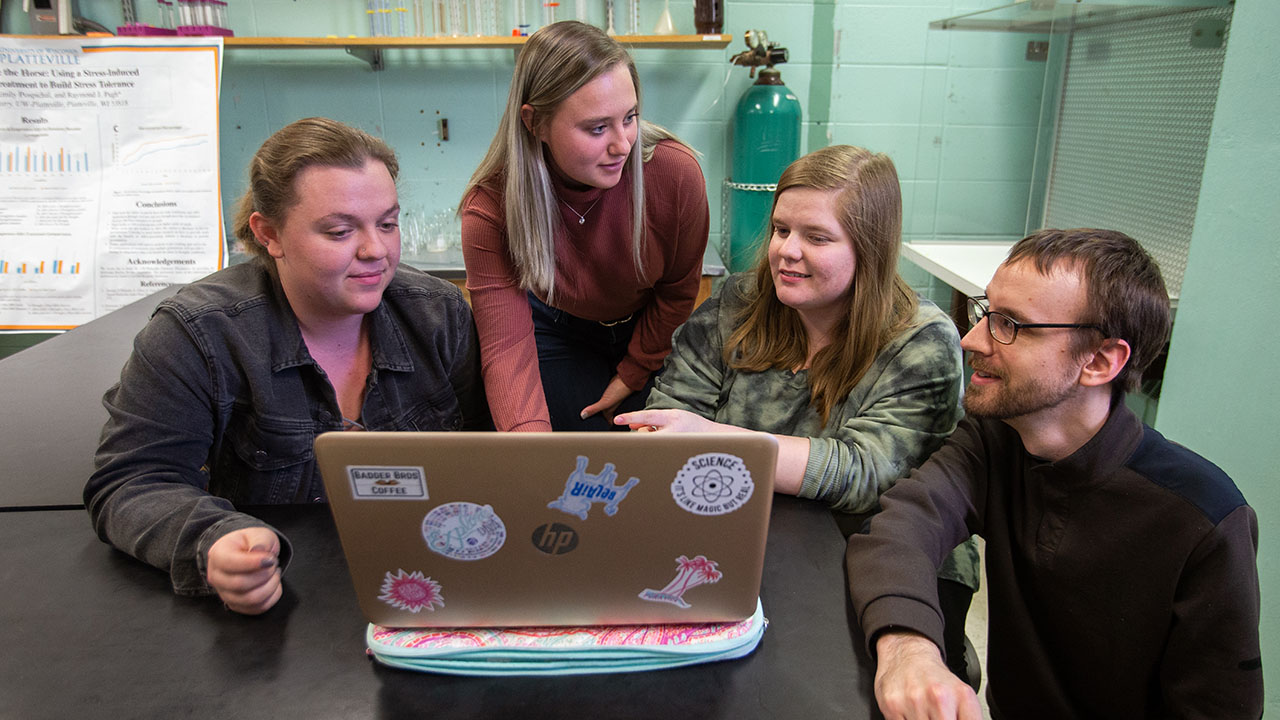
Four University of Wisconsin-Platteville chemistry students are preparing to present their undergraduate research, learning biochemistry the write way: applying writing-to-learn in STEM, at three different events across the country. Frances Tempesta, Michael Schneider, Hannah Frank and RevaLu Ronnfeldt will showcase their work at the 17th annual Research in the Rotunda in Madison, Wisconsin. Tempesta, Schneider and Ronnfeldt will then travel to the American Chemical Society National Meeting and Expo in Philadelphia, Pennsylvania, and Posters on the Hill in Washington, D.C.
The students are collaborating with Dr. Raymond Pugh, assistant professor in chemistry. Writing-to-learn is the idea of using writing to promote a deeper understanding of concepts to students. According to the research group, Pugh applied a writing assignment to three main constructs he teaches in his biochemistry class. They were chosen as foundational subjects biochemistry students will need to understand to learn other aspects of the field.
“It’s to help students who are taught a certain concept of biochemistry and given a certain writing prompt entailed to a specific audience,” said Tempesta, a senior majoring in chemistry from Racine, Wisconsin. “It goes under a peer review process which will help them understand concepts in biochemistry.”
“This is a way for students to actually teach themselves beyond a lecture,” added Schneider, a senior double-majoring in chemistry and forensic investigation from Stratford, Wisconsin. “This is a way for students to work with each other, become interested in the material and in each other’s work to really understand what’s going on.”
To help with the grading process the students created rubrics which focus on written work, peer review comments and test scores. “There’s a lot more reading and a lot more intentionality to how you’re grading everything,” said Ronnfeldt, a senior double-majoring in chemistry and broad field science from La Farge, Wisconsin. “It’s been very interesting to learn how to go about grading something so it can be numerically quantified.”
“You’re trying to get numbers out of a non-specific system like people writing a paper about something; having rubrics that sometimes cover everything and sometimes don’t is an interesting thing to do,” said Schneider.
Reading through the students’ different writing styles opens up a broader perspective of how individuals understand material. “It makes you step back and think about how you yourself interpret material, and all the other chemistry classes we are taking besides biochemistry,” said Tempesta.
On March 11 the group will deliver their research in the capitol rotunda to state leaders, legislators and peers from across the UW System. They want lawmakers to understand writing-to-learn is cross-disciplinary and the impact it could have in the education field.
“It’s not just chemistry research. It applies to all STEM courses. It applies outside of STEM as well,” said Ronnfeldt. “If it does turn out to be an effective teaching method, we are giving other teachers an opportunity to use a new technique.”
Following Research in the Rotunda, they will head to the East Coast during their spring break to present at the ACS conference. “This is a national conference specifically for chemistry,” said Schneider. “This will be pretty different from the other conferences we will be going to where we will be talking to people who may not be as well read in chemistry.”
In April the group will travel to Capitol Hill to discuss their research with U.S. congressional members and their staff. They were selected as one of 60 undergraduate research groups from around the country to attend Posters on the Hill.
The group is proud to represent UW-Platteville and said it validates the importance of their research. They’re looking forward to voicing their project and seeing what other universities are studying.
“It’s really great we have the opportunity to go and talk about this at a national level,” Tempesta said. “Even though it seems like it’s just a writing assignment it has a big impact on all types of education. It will be important to express that at the national level.”